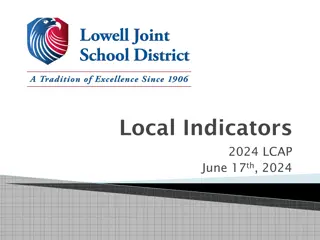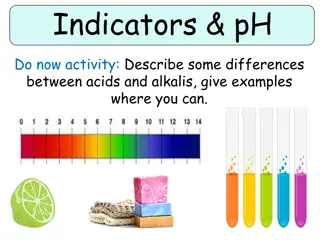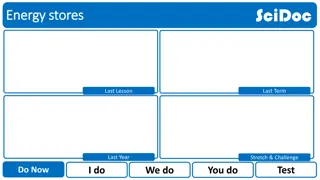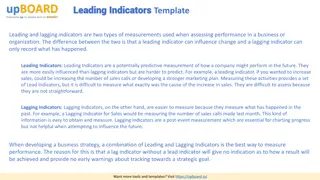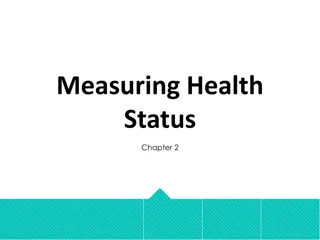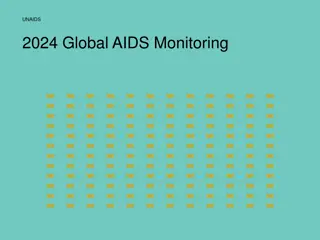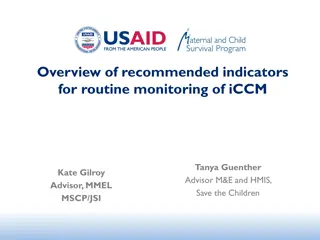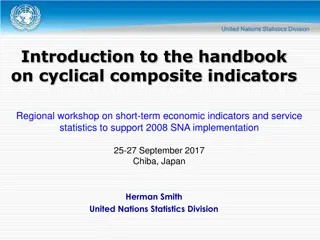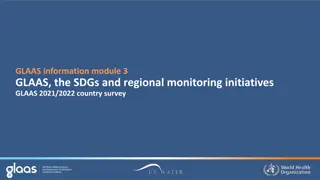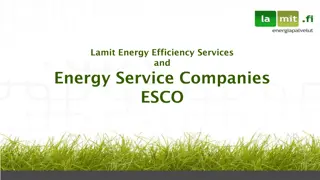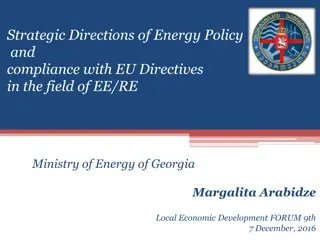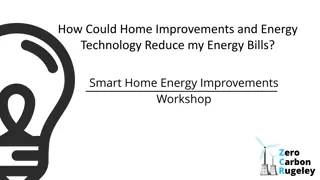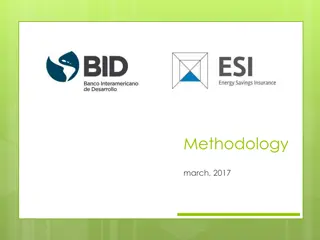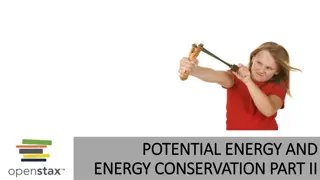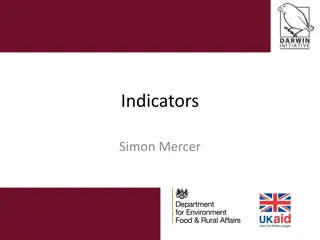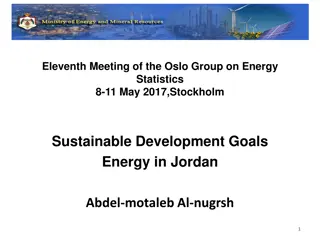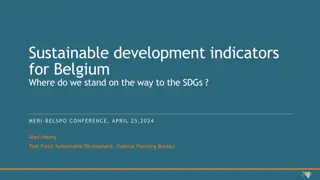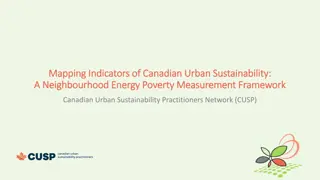Green Energy Market
Green energy also referred to as clean energy, is usually derived from natural sources that are constantly replenished. Solar energy, wind energy, hydroelectric power, biomass energy, geothermal energy, tidal energy, and wave energy are different types of renewable energy. Solar energy is the radian
5 views • 6 slides
Comprehensive Overview of Energy Balances in Germany
This material covers various aspects of energy balances in Germany, including components of energy flowcharts, renewable energy sources in the German energy balance, and total final consumption of road transport energy. It provides a detailed analysis of energy imports, domestic extraction, losses,
2 views • 10 slides
Understanding Energy: Types, Potential, and Kinetic
Dive into the world of energy with a comprehensive guide covering the definition, types, and characteristics of gravitational, potential, and kinetic energy. Explore how energy is the driving force behind all work and movement, with examples and explanations provided for each energy type. Gain insig
2 views • 24 slides
Sustainable Energy Initiatives at Local Level in Lithuania
The National Parliamentary Workshop on Energy Efficiency highlighted the importance of renewable energy development and sustainability at the local level in Lithuania. Initiatives such as the Breakthrough package and Renewable Energy Communities aim to improve energy efficiency, reduce energy povert
2 views • 12 slides
Understanding Impact Indicators in Monitoring and Evaluation
Impact indicators play a crucial role in monitoring and evaluating activities, projects, or programs. Direct indicators directly measure results, while indirect indicators are used when direct measures are not feasible. Quantitative indicators are expressed numerically, while qualitative indicators
3 views • 4 slides
Pharmacovigilance Indicators for Monitoring Health Interventions in India
The pharmacovigilance indicators outlined by the Indian Pharmacopoeia Commission focus on evaluating the status of pharmacovigilance systems in India. These indicators help measure the effectiveness of health services and interventions, identify strengths and weaknesses, and determine the impact and
2 views • 14 slides
Ensuring Local Indicators Compliance in California's Education System
The document outlines the required local indicators for LCFF priorities in California schools, emphasizing basics like teachers and facilities, academic standards implementation, and parent engagement. It also touches on school climate, course of study, and the criteria for LEAs/charters to be rated
2 views • 7 slides
Understanding Indicators and Standards in Environmental Management
Exploring the concept of indicators and standards in environmental management, this content delves into their definition, selection process, sources, and importance. Indicators are crucial variables used to track changes caused by human activities, aiding in assessing progress towards desired condit
1 views • 27 slides
Understanding Acids and Alkalis: pH Scale and Indicators
Explore the differences between acids and alkalis, learn about indicators, pH scale, and how to categorize solutions as acidic, alkaline, or neutral. Understand the importance of universal indicators in determining acid and alkali strength. Discover the disadvantages of using red and blue litmus pap
3 views • 11 slides
Exploring Energy Stores and Transfers in Science Lessons
Dive into the fascinating world of energy stores and transfers through engaging science lessons. Recall different energy stores, common energy transfers, and create flow diagrams to illustrate energy transfers in various scenarios. Explore gravitational, elastic, magnetic, electrostatic potential en
4 views • 9 slides
Energy Assistance Workshop Series Statewide Assessment
The Energy Assistance Workshop Series conducted a statewide assessment to understand energy burden and discuss utility energy assistance programs. The goal was to evaluate the effectiveness of mechanisms for energy assistance to prioritize households with higher energy burdens. The workshops aimed t
0 views • 26 slides
Understanding Indicators in Strategic Planning and Information Management
Explore the importance of indicators in monitoring and evaluation, learn about different types of indicators such as baseline, output, and outcome. Discover the qualities of a good indicator and the various forms they can take, from direct to qualitative and standardized global indicators versus loc
2 views • 19 slides
Understanding Energy Transformation in the Natural World
Energy transformation occurs continuously in various forms around us, following the Law of Conservation of Energy. From thermal to chemical and electromagnetic energy, different types of energy are converted and utilized in everyday processes. Examples include the conversion of thermal energy to ele
0 views • 27 slides
Understanding Energy - Forms, Calculations, and Applications
Explore the concept of energy through various images, including forms of energy, kinetic versus potential energy, and calculations involving kinetic and potential energy. Learn about identifying energy states, calculating kinetic energy, and solving physics problems related to energy transfer. Dive
0 views • 27 slides
Understanding Energy Transfers with Sankey Diagrams
Sankey diagrams are visual tools that depict energy transfers within a system, offering insights into efficiency and energy distribution. By examining the width of arrows representing energy flow, one can analyze useful and wasted energy outputs. Inefficient systems show a disproportionate amount of
1 views • 9 slides
Understanding Leading and Lagging Indicators in Business
Leading and lagging indicators play crucial roles in assessing the performance of a business or organization. Leading indicators are predictive, influencing future outcomes, while lagging indicators record past events. A strategic combination of both types is essential for measuring performance effe
1 views • 4 slides
Understanding Health Status Indicators and Measurements
Health status indicators play a crucial role in assessing overall health status at individual, group, and population levels. These measurements, such as self-assessed health status and life expectancy, provide valuable insights for governments to identify trends, enact appropriate interventions, and
2 views • 18 slides
Updates and New Indicators in 2024 Global AIDS Monitoring Reports
Updates in the 2024 Global AIDS Monitoring reports include new indicators related to gender equality, human rights, and stigma elimination, changes to existing indicators, and terminology updates. Four new indicators focus on gender responsiveness of HIV services, discriminatory attitudes in health
0 views • 21 slides
Overview of Recommended Indicators for Routine Monitoring of iCCM
Process to review and refine iCCM indicators for routine monitoring initiated by the M&E sub-group of the global CCM Task Force. The group developed a list of 10 indicators in 6 domains, including Human Resources, Referrals, Service Delivery, Reporting, Supply Chain, and Clinical Coaching. These ind
0 views • 11 slides
Developing Proxy Indicators for Farm Profitability in Irish Agriculture
This study by Ciara O'Donovan focuses on developing and testing proxy indicators of farm profitability and efficiency measurements for knowledge transfer use on Irish farms. The research aims to identify indicators of farm performance, tailor them based on enterprise, scale, and seasonality, and tes
0 views • 20 slides
Handbook on Cyclical Composite Indicators Overview
This content provides insights into cyclical composite indicators, their objectives, features, and importance in economic analysis. It emphasizes the need for harmonized principles and standards in compiling these indicators for better international comparisons and economic assessments. The handbook
0 views • 23 slides
Conducting an Effective School Energy Audit
Performing an energy audit at a school helps in understanding energy usage patterns, identifying areas of waste, and creating energy-saving action plans. The audit involves collecting data, creating switch-off lists, and filling out templates methodically to track energy consumption. It should be do
0 views • 16 slides
Early Warning Indicators for Pine Island Glacier in West Antarctica
The study examines the tipping points and early warning indicators for Pine Island Glacier in West Antarctica, a key contributor to sea-level rise. Through an advanced ice flow model, the research reveals three tipping points and their associations with ocean warming. The findings also introduce ear
0 views • 8 slides
Understanding Energy Indicators and Their Significance in Environmental Analysis
Exploring the importance of energy indicators in environmental analysis, this content delves into various types of indicators, such as econometric, physical, and efficiency indicators. It highlights the need for clear objectives in measurement and coherence between energy aspects and activities. Add
0 views • 18 slides
Understanding Different Forms of Energy and Work in Physics
Energy in physics is the capacity to do work, and there are various forms of energy such as radiant energy, kinetic energy, gravitational potential energy, elastic potential energy, chemical potential energy, nuclear potential energy, electrical potential energy, thermal energy, and sound energy. Ea
0 views • 47 slides
Comprehensive Overview of GLAAS, SDG Monitoring, and Goal 6 Indicators
The content delves into the Global Analysis and Assessment of Sanitation and Drinking-Water (GLAAS), its relationship with the Sustainable Development Goals (SDGs), particularly Goal 6 on clean water and sanitation. It discusses regional monitoring initiatives, the 2030 Agenda for Sustainable Develo
0 views • 16 slides
Understanding Energy Service Companies (ESCOs) and Their Role in Energy Efficiency
Energy Service Companies (ESCOs) like Lamit offer a range of energy services, from implementing energy-efficiency projects to renewable energy solutions. These companies work as long-term energy management partners, focusing on understanding customer needs, providing energy-saving solutions, and gua
2 views • 18 slides
Overview of Energy Policy and Compliance with EU Directives in Georgia
Ministry of Energy in Georgia focuses on strategic directions for energy policy in alignment with EU directives. The Energy Strategy, Covenant of Mayors, and National Energy Efficiency Action Plan are key initiatives promoting energy efficiency and renewable energy. Projects include consultancy on s
0 views • 10 slides
Exploring Home Energy Improvements and Smart Technology for Energy Efficiency
Discover how home improvements and energy technology can significantly reduce energy bills. Join the Smart Home Energy Improvements Workshop in Zero Carbon Rugeley to explore approaches for sustainable energy production and usage at home. Learn about retrofitting, smart energy systems, and meet char
0 views • 20 slides
Challenges and Opportunities in Science and Technology Policy Indicators
Towards creating indicators for the field of science and technology policy, this content discusses the increasing demands in research management and evaluation, the potential role of indicators in decision-making, the drawbacks of conventional indicators, and the current issues with the usage of sci
0 views • 44 slides
Social, Economical, and Technical Impact of Clean Energy Technologies
This course covers the management of micro-level clean energy projects, emphasizing the social, economic, and technical impacts of selected clean energy technologies. It discusses project organization, tools, project life cycle, financial analysis, barriers, capacity building, and more. It delves in
0 views • 32 slides
Energy Efficiency Methodology for Project Structuring and Validation
This content discusses the methodology for designing balanced Monitoring, Reporting, and Verification (MR&V) processes and energy efficiency projects focusing on small equipment substitution, modernization, and standardization. It introduces the ISO50006 standard, Energy Performance Indicators (EnPI
0 views • 11 slides
Understanding Energy Basics: Temperature, Heat, and Transfer
Explore the fundamental concepts of energy, including temperature, heat, and energy transfer. Learn how temperature differs from heat, how they are measured, and the relationship between thermal energy and water volume. Discover the role of chemical energy and sound energy, and how energy is transfo
0 views • 12 slides
Understanding Elastic Potential Energy and Energy Conservation Principles
Elastic potential energy is stored in elastic bodies like springs and is vital in understanding energy conservation principles. This energy can be calculated using the work done by an ideal spring on a block. By applying elastic potential energy concepts, one can analyze scenarios where a spring sys
0 views • 9 slides
Understanding Indicators in Monitoring and Evaluation
Indicators play a crucial role in monitoring and evaluation by providing signals of progress and success. They measure change, outcomes, and achievements of projects or programs. Different types of indicators exist, such as quantitative, performance, achievement, and accountability indicators. It is
0 views • 12 slides
Understanding Energy: Potential and Kinetic Forms in Grade 7 Natural Sciences
Energy in various forms is explored in Grade 7 Natural Sciences, with a focus on potential and kinetic energy. Energy is the ability to do work and exists in different types like heat, chemical, electromagnetic, nuclear, and mechanical. The sun serves as a primary energy source. Potential energy is
0 views • 11 slides
Energy Strategy and Challenges in Jordan: Towards Sustainable Development
The Eleventh Meeting of the Oslo Group on Energy Statistics discussed the energy sector in Jordan, highlighting challenges such as population growth, energy demand, and high energy costs. Jordan aims to diversify energy resources, reduce oil dependency, and enhance environmental protection through i
0 views • 34 slides
Understanding Food for Peace Indicators and Evaluation Surveys
This content provides an overview of Food for Peace (FFP) indicators for baseline and final evaluation surveys, with insights on collecting and analyzing data related to key indicators such as household food access, nutrition status, WASH, agriculture, poverty, gender, and family planning. It discus
0 views • 14 slides
Sustainable Development Indicators for Belgium: Progress Towards the SDGs
Belgium's progress on sustainable development indicators towards the Sustainable Development Goals (SDGs) is tracked through a set of global and national indicators. Key updates in the 2024 report include new indicators on child poverty and digital skills, along with revised definitions for capital
0 views • 16 slides
Mapping Indicators of Canadian Urban Sustainability: A Framework for Neighborhood Energy Poverty Measurement
The Canadian Urban Sustainability Practitioners Network (CUSP) is implementing a project to reduce energy poverty through local clean energy access programs. The project aims to achieve energy and emissions goals, transition to clean energy, and benefit low/moderate-income households. By utilizing a
0 views • 24 slides






